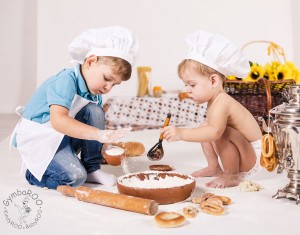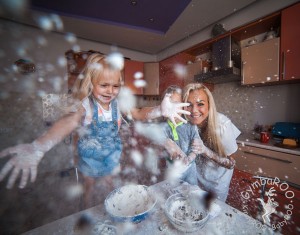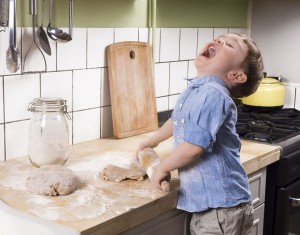Join the thousands of parents already raising smarter, happier babies with our online baby classes: The Active Babies Smart Kids series. Click here.
GymbaROO-KindyROO kids are excelling academically, emotionally, in leadership roles and on the sporting field. Find us at: GymbaROO-KindyROO
Robyn Floyd
Kitchen activities are a fabulous way to help your children learn basic cooking skills while helping them to absorb language, recognise words and symbols and practice measurement and number skills.
The list of developmental learning skills that can be assisted by cooking is endless. This list includes; sequencing and prioritising through following recipe directions; understanding cause and effect of solids and liquids; hygiene and cleanliness; social skills and developing good organisational skills. Cooking encourages creativity, develops motor skills, such as hand-eye coordination and manual dexterity and is an activity where the end result, as well as the process, is important. It has to taste good!
 After cooking with my daughters and numerous nieces and nephews, I also know that when siblings are cooking together, there is no end of opportunities for ‘teachable moments’. Learning negotiation and teamwork skills will be useful in later life as well as immediately… when there is only one mixing bowl!
After cooking with my daughters and numerous nieces and nephews, I also know that when siblings are cooking together, there is no end of opportunities for ‘teachable moments’. Learning negotiation and teamwork skills will be useful in later life as well as immediately… when there is only one mixing bowl!
Of course eating the results of your toddler’s endeavor is cause for a social event, even if it is an afternoon in the cubby house with assorted toys and freshly baked biscuits. Here are some tips for making the first cooking efforts of your child an enjoyable experience for both of you.
Starting with the saucepan cupboard
Teach your toddler that cooking is fun and allow them to have their own cooking drawer, complete with a safety gadget to stop fingers getting jammed! While you are cooking, they can be having fun with inexpensive plastic containers and old kitchen utensils. Alternatively buy or make a kitchen play set with your imagination and recycled materials. Make time to play ‘cooking’ with your child.
Sharing the excitement of creating safely
Children learn best by example. Talk about what you are doing and why you are doing it while you are preparing food. Tell them why you need to whisk the egg. Show them what the egg look like before it is whisked and then after. Talk and demonstrate kitchen safety constantly. Make sure you emphasise what is hot and what is not safe to touch. At the times when it is unsafe for direct involvement, your ‘toddler-cook’ should be watching from a safe position (maybe a high chair) close to the action.
 It’s important to make something that doesn’t take too much time, as toddlers want quick results. Parent patience is necessary when disasters occur – the egg… or the entire bowl, knocked off the bench etc. However, take a deep breath… you can choose to see this is yet another learning opportunity or even an opportunity to have a laugh together, after all, cooking with your toddler is more about your time together rather than the result.
It’s important to make something that doesn’t take too much time, as toddlers want quick results. Parent patience is necessary when disasters occur – the egg… or the entire bowl, knocked off the bench etc. However, take a deep breath… you can choose to see this is yet another learning opportunity or even an opportunity to have a laugh together, after all, cooking with your toddler is more about your time together rather than the result.
Allow your toddler to help with small jobs such as tipping in ingredients, stirring the mixture, washing the vegetables and passing utensils to you. Of course, good habits begin early, so encourage your toddler to help with the ‘clean-up’.
Age appropriate skills for toddler-cooks
- Pizza: Place pre-cut ingredients on the pizza base.
- Fruit salad: Mix the fruit you have chopped. The toddler cook could peel and cut banana slices with plastic knife.
- Cakes and biscuits: Help pour, then mix ingredients that you have pre-measured.
- Salads: Tear the lettuce for salads.
- Biscuits: Roll biscuit dough and cut biscuit dough with cookie cutters
- Crumbs: Crush crackers and biscuits in a plastic kitchen bag to make crumbs.
- Dip: Dip foods that require dipping.
 Cooking is a multi-sensory experience and whether or not you explicitly ‘teach’ your children, they will learn through their senses. Talk about and ask questions to help build sensory skills through tasting, hearing, touching, smelling and seeing different foods. Talk about flavours can you taste in the dish. Is it salty, spicy, sugary? What noises do you hear when mixing, grating, sifting, melting? What does biscuit dough feel like when you have rolled it out? How does the food smell before and after you cook it? Is the colour of the cake when it’s baked different to the colour of the cake mixture?
Cooking is a multi-sensory experience and whether or not you explicitly ‘teach’ your children, they will learn through their senses. Talk about and ask questions to help build sensory skills through tasting, hearing, touching, smelling and seeing different foods. Talk about flavours can you taste in the dish. Is it salty, spicy, sugary? What noises do you hear when mixing, grating, sifting, melting? What does biscuit dough feel like when you have rolled it out? How does the food smell before and after you cook it? Is the colour of the cake when it’s baked different to the colour of the cake mixture?
Simple Recipes for Toddlers
You can find hundreds of simple recipes to cook with your toddler online, however here are a few favourites.
Creating Arty Bread: Spread slices of bread with cream cheese or nut butter for a blank canvas. Put a range of toppings in small plastic bowls to be arranged decoratively to make a picture. Try sliced bananas, apple dices, strawberry slices, sliced grapes, alfalfa, bean shoots, grated carrot, zucchini slices or cucumber slices.
Milk shakes: Place a cup of milk, half a cup of fruit that has been cut into small pieces (banana, strawberries, peaches or a soft fruit) into a blender. Blend, stop and add a scoop of yoghurt into the blender mix. Blend again and enjoy.
Mini pizzas: Spoon a tablespoon of pizza sauce on to mini pita bread. Make your own pizza-to-go with cheese and vegetables of your choice. Bake in the oven at 180C for about ten minutes or until the cheese is melted and the pita is toasty.
Apple Muffins: Sift 2 cups plain flour and 4 teaspoons of baking powder into a bowl. Add ¼ cup sugar. Grate a green apple into a bowl. Mix an egg, 1 teaspoon grated lemon rind and 60 g melted butter. Add apple and egg mixture all at once and stir. It might look a bit lumpy. Fill greased muffin pans and bake in the oven at 220C for 15-20 minutes.
Enjoy cooking with your toddler and have fun. One day the child who has made you rubbery scrambled eggs for your birthday will have mastered the art of cooking and will be serving you a gourmet meal. It just takes time, patience and enthusiasm.
Robyn Floyd (M.Ed. (Deakin) B.Ed. (Monash) ACEC Teacher of the Year 2008)
Robyn has been a teacher of primary school age children for many years. She has seen the many long term educational and social benefits of activities in the early years that promote readiness for learning through fun activities such as cooking. Excerpt from GymbaROO’s First Steps magazine #71
GymbaROO-KindyROO
Thousands of parents, babies and children are presently involved in our programs and creating rising stars. GymbaROO-KindyROO kids are excelling academically, emotionally, in leadership roles and on the sporting field. Come join all the fun and learning! “GymbaROO – The best decision I ever made for my child.” Classes from 6 weeks old – 7 years GymbaROO KindyROO
Active Babies Smart Kids – Online Baby Classes
GymbaROO-KindyROO’s online series of baby classes is taking the parenting world by storm! It is highly recommended by doctors, paediatricians, early childhood experts and the Maternal Child and Family Health Nurses Association. This series is being called: “The essential guide for parents”. Join the thousands of parents already playing with their babies from birth, in the best way for brain and body development and laying crucial foundations for future learning. What happens in the first year, not only matters, it matters a lot! Introductory video below.
Active Babies Smart Kids online series – Click here.
Try the first class FREE! Click here to watch our Active Babies Smart Kids Episode 1 – Tummy Time
Enjoy the following GymbaROO-KindyROO articles
GymbaROO-KindyROO: Who, what, where, why and how
All about GymbaROO-KindyROO’s online baby classes for parents and babies: Active Babies Smart Kids
How to raise a smarter, happier baby
Why active babies make smart kids
Become a GymbaROO-KindyROO franchisee
Finger Painting – A Brilliant Activity for Babies and Toddlers.
When will my baby / toddler become right or left handed?
Reading to babies and children gives them an early cognitive advantage. New research.
NAPLAN results improve with LESS reading and maths and MORE GymbaROO.
To my elected childcare, preschool or school: Please include a GymbaROO sensorimotor program.
Kids learning ability jumps 2 years with 25 minute GymbaROO movement program 3x a week.

